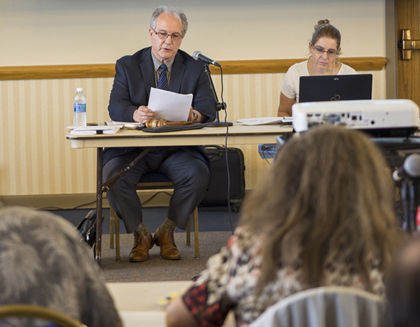Faculty union seeks bargain for salary increase

Faculty union seeks bargain for salary increase
October 4, 2017
DeKALB — Tenured and tenure-track faculty have been attempting to collectively bargain with the university to negotiate a new contract and plead for a salary increase.
The United Faculty Alliance became officially recognized by the Illinois Regulation and Labor Board in June 2016. Members have been collectively bargaining for a new contract since June and hope to have a new contract by the end of the academic year. The United Faculty Alliance and the administration established negotiation teams that meet to decide what bargaining demands will be met and which ones denied.
Kate Cady, United Faculty Alliance representative at large, said unionization and negotiations assure members obtain the same benefits across the board.
“It gives [members] a lot more contact across the whole university to see how other faculty’s work life is,” Cady said.
The union allows for faculty to keep track of the conditions in which their colleagues work, a networking resource of sorts.
Rosemary Feurer, United Faculty Alliance vice president, said collective bargaining is meant to unite faculty to help everyone as individuals and as a group.
“The university tries to suggest that people earn the pay according to their contribution,” said Feurer. “Try harder, work harder, and you will be rewarded.”
A point of contention in the contract negotiations has been the announcement made by acting President Lisa Freeman of a potential 3 percent wage increase for all non-union university employees, Feurer said.
“This is a big issue now because the administration put out a big release saying everyone [who]is getting the raise cannot be in a union,” Feurer said. “We have to negotiate it.”
It will be determined if unionized employees are eligible for the 3 percent salary increase pending the results of a collective bargaining process, according to a salary increment Q-and-A available on NIU’s website.
Feurer said she expects negotiations to last until the end of the academic year since the length of the negotiations relies on the timeliness of the university’s response to the union’s collective bargaining demands.
“Right now, we’re offering up the agreeable things with good language,” Feurer said. “We want things to be really clear — how an issue comes up, how we’re going to resolve it. The faster the university responds to these issues, the quicker it gets done.”
No group on campus has received a wage increase since January 2012, and with new tasks being added to their jobs, faculty members think the time has come to see added benefits.
The reasons a wage increase is needed stem from new tasks added to what the university expects from faculty, Feurer said.
“We’ve been saddled with new job duties, recruiting students, healthcare costs, been denied travel costs to conferences, and we’ve had to pay out of pocket,” Feurer said. “We’ve actually had a pay decrease with all that.”
Feurer said professors are now expected to be in constant contact with students, something she said was not the norm in the past. They are also expected to be involved in initiatives including recruiting events and research. Feurer also said salaries have not increased despite inflation and rising healthcare costs over the years.
The NIU negotiation team is headed by Murali Krishnamurthi, chief negotiator and vice provost for Faculty Affairs. The rest of the team is made up of William Pitney, College of Education associate dean; Kirk Miller, College of Liberal Arts and Sciences associate dean; Jana Brubaker, University Libraries acting associate dean; Terrence Bishop, College of Business adviser; James Ciesla, College of Health and Human Services associate dean; and Marlene Bryan, Human Resource Services administrative assistant with a specialty in labor relations.
Representatives of NIU’s negotiation team declined comment. Spokesperson Joe King also declined comment about the ongoing negotiations, citing a university policy that restricts discussion about ongoing contract negotiations.






